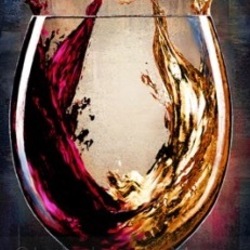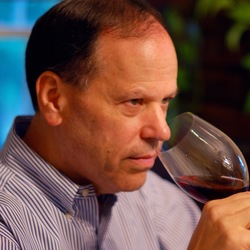Le Jardin De Petit Village
Château Bellevue de Fourcas Dupré
Listrac-Medoc Merlot Blend 2010
Smooth Bordeaux with steak frites at Raoul’s in Greenwich Village — 8 years ago
Domaine Louis Michel
Montmain Chablis 1er Cru Chardonnay 2014
The 14 Chablis are really good. This Louis Michel is no different. An excellent example of little intervention of good fruit. This producer uses no oak; which I really appreciate. After you start to appreciate good Burgundy, CA Chardonnays aren't that interesting. Not that I don't ever drink or enjoy some CA Chardonnay producers, I just prefer the cooler climate Chardonnays that don't use new oak. This 14 was clean through and through. Bright citrus, peach, touch of green apple, soft minerality, touch of saline, creamy texture and beautiful round acidity and ripe, elegant finish. Photos of, Louis Michel vineyard, vineyard heat sources to protect the vine buds during their sometimes difficult Spring weather/frosts, Guillaume Michel (Owner/Winemaker) and their Domaine. Producer notes and history...It was largely believed that Michel family had only been cultivating Chablis since 1850. More on that in a bit. The winery is situated right in the heart of the village with 25 hectares spread over the very first slopes that were discovered by Cistercian monks in the 11th century. 40 years ago, the family decided to stop making the wine in wooden barrels, preferring to create clean, pure and precise Chablis without adding artificial woody tastes. I've said it more than once and I'll say it again, if you have good white grapes, strong wood use only covers up good fruit flavor or hides mistakes either in the vineyard or cellar, baring a stylistic choice. Through this philosophy, combined with the limited yields inspired by organic wine-growing techniques, the Domaine has developed a worldwide reputation for fine wine-making in stainless steel tanks. Today, the Domaine is managed by Jean-Loup Michel and his nephew, Guillaume Michel, who is continuing the family tradition. The importance of their work in the vineyards cannot be overstated. Guillaume Michel is a firm believer in the philosophy that if you do a good job in the vineyard, 90 per cent of the work is done when the grapes arrive at the winery. This statement could not be more true in my opinion. It his grandfather who started the philosophy, Guillaume has only continued it and evolved it with modern changes equipment etc.. It’s a matter of preserving the authenticity of each terroir...working with very pure and clean wines. They understand and like to work differences in terroir. Making it very important to have the same vinification for all the different terroirs. It is important to have an aromatically neutral vinification. Up until recently it was believed that the winemaking history of the family began in 1850, but thanks to Guillaume’s mother and her genealogical pursuits the date has been moved back to at least 1640. Around that time a winemaker from nearby Tonnerre settled in Chablis, marking the beginning of the families venture in Chablis. Domaine Louis Michel covers a total of 25 hectares. A very large part (15 hectares) is the domaine’s premier crus. In addition to that there is two hectares of Petit Chablis vines, six hectares of village Chablis and two hectares of grand crus. Vaudesír is the families biggest grand crus. Vaudesír is interesting because it is actually a valley. One side facing south, very hot, producing concentrated and powerful wines. In Grenouilles, Domaine Louis Michel has half a hectare at the top of the slope. This nine hectare grand cru is just over 7 hectares and is owned by the cooperative La Chablisienne. Vaudesír and Grenouilles are quite similar in terms of soil. Vaudesír has a bit more of clay. Les Clos, their third grand cru, is very rocky. Les Clos is the typical Kimmeridgian soil of Chablis. If you're like me and enjoy your white wine with good clean fruit rather than with oak or too much oak but haven't tried Louis Michel wines, pick up a bottle. I think you'll fall in love with the style and the value as many are under $30.
— 8 years ago
SLO Down Wines
Sexual Chocolate California Red Blend
Y. One of my favs. Big, bold. First found in Shirlington Village, Arlington at Cheesetique with Jen. ($25) — 10 years ago
Tamarack Cellars
Firehouse Red Columbia Valley Merlot Blend 2010
Y. Vurry Enjoyable. Found at Curious Grape, Shirlington Village, Arlington. — 10 years ago
Parsonage Village Vineyard
Bixby Reserve Petit Verdot 2011
Blending varietal standing on its own very nicely. — 10 years ago
Nevo Boutique Winery
Limited Edition Matta Village Petit Verdot 2012
Perfect wine .. — 11 years ago
Cavalli
Tenuta Degli Dei Toscana Super Tuscan Blend 2012
Owned by the family since the early 70s, estate is located in the village of San Leolino, near Panzano in Chianti. A blend of 50% Cab Sauv, 35% Petit Verdot & 15% Cab Franc, aromas of fruit and floral notes. On the palate raspberry and cranberry flavors with some herbal notes. Firm tannins, good balance ending with earthy mineral character. — 7 years ago
La Vigne du Perron
Les Etapes Pinot Noir 2009
Rubis clair
Nez de petit fruit rouge léger épices et notes d orange sanguine avec l aeration
Bouche simple sur un très beau fruit sans boise
Finale sur les fruit rouges acidulés et une pureté crayeuse
Pourrait être un très beau chambolle musigny village
Un superbe pinot noir des alpes nature et sans déviance — 8 years ago
Tenuta dell'Ornellaia
Le Serre Nuove dell'Ornellaia Bolgheri Rosso Merlot Blend 2014
Thought I was getting the '13, but restaurant did the ol' vintage switcheroo. Still very good considering how disastrous 2014 was for Tuscan reds. The leather really stood out on this one plus some rustic tannins. Which worked just fine for a spicy penne in tiny Alpine village. Merlot dominant plus some other bdx varietals. Drink now. — 8 years ago
Domaine La Hitaire
Jardin d'Hiver Côtes de Gascogne Petit Manseng Gros Manseng 2013
Very nice daily wine. Acid was on point, kind of a pear sweetness in there. — 9 years ago
Benoît Lahaye
Le Jardin de Pa Grosse Pierre Grand Cru Champagne
Cool ass field blend for u chumps!!! #chumpagnestudy — 9 years ago
Buena Vista Winery
The Sheriff Sonoma County Red Blend
The Sheriff is a matrix of complexity with medium to full voluptuousness combined with vanilla, spice, tannins, and every dark Halle Berry mustered off the vine. Drink this with marathon pace or you will promptly become the village drunkard. Cowboy Up Sooner 💃🔫 😉! — 10 years ago
Le Jardin de Petit Village
Pomerol Merlot 2004
A rare 100% merlot wine — 12 years ago
Château Lynch-Bages
Grand Cru Classé Pauillac Cabernet Sauvignon Blend 2000
The 2000 is delicious but, it is evolving at a glacial pace. Out of magnum.
On the nose, touch of barnyard, glycerin, ripe; blackberries, dark cherries, black raspberries, plum, strawberries & cherries. Vanilla, dry clay, limestone, river stones, just a touch of pyrazines & bandaid, dark,,turned, moist earth, dry grass and dry & fresh dark florals.
The body is full, round & sexy. Dry softened, sweet tannins. ripe; blackberries, dark cherries, black raspberries, plum, strawberries & cherries. Vanilla, dry clay, limestone, river stones, just a touch of pyrazines & bandaid, fresh tobacco leaf, saddle-wood, dry underbrush, dark, turned, moist earth, dry grass and dry & fresh dark florals. The acidity is magnificent. The structure, tension, length and balance are sensational. The finish is drop dead gorgeous. I’d still hold mine another 5 years as long as you have 3-4 bottles for more 5 year increments.
Photos of, their Estate vines, Clyde Beffa-Owner of K&L Wine Merchants, Owner of Chateau Lynch Bages - Jean-Michel Cazes, guests of the dinner and a sunset view from their Estate.
Producer notes and history...Lynch Bages takes its name from the local area where the Chateau is located in Bages. The vineyard of what was to become Lynch Bages was established and then expanded by the Dejean family who sold it in 1728 to Pierre Drouillard.
In 1749, Drouillard bequeathed the estate to his daughter Elizabeth, the wife of Thomas Lynch. This is how the estate came to belong to the Lynch family, where it remained for seventy-five years and received the name Lynch Bages. However, it was not always known under that name.
For a while the wines were sold under the name of Jurine Bages. In fact, when the estate was Classified in the 1855 Classification of the Medoc, the wines were selling under the name of Chateau Jurine Bages. That is because the property was owned at the time by a Swiss wine merchant, Sebastien Jurine.
In 1862, the property was sold to the Cayrou brothers who restored the estate’s name to Chateau Lynch family.
Around 1870, Lou Janou Cazes and his wife Angelique were living in Pauillac, close to Chateau Pichon Longueville Baron. It was here that Jean-Charles Cazes, the couple’s second son, was born in 1877.
In the 1930’s, Jean-Charles Cazes, who was already in charge of Les-Ormes-de-Pez in St. Estephe agreed to lease the vines of Lynch Bages. By that time, the Cazes family had history in Bordeaux dating back to the second half of the nineteenth century.
This agreement to take over Lynch Bages was good for both the owner and Jean Charles Cazes. Because, the vineyards had become dilapidated and were in need of expensive replanting, which was too expensive for the owner. However, for Cazes, this represented an opportunity, as he had the time, and the ability to manage Lynch Bages, but he lacked the funds to buy the vineyard.
Jean-Charles Cazes eventually purchased both properties on the eve of the Second World War. Lynch Bages and Les-Ormes-de-Pez have been run by the Cazes family ever since. In 1988, the Cazes family added to their holdings in Bordeaux when they purchased an estate in the Graves region, Chateau Villa Bel Air.
Around 1970, they increased their vineyards with the purchase of Haut-Bages Averous and Saussus. By the late 1990’s their holdings had expanded to nearly 100 hectares! Jean-Michel Cazes who had been employed as an engineer in Paris, joined the wine trade in 1973. In a short time, Jean Michel Cazes modernized everything at Lynch Bages.
He installed a new vat room, insulated the buildings, developing new technologies and equipment, built storage cellars, restored the loading areas and wine storehouses over the next fifteen years. During that time period, Jean Michel Cazes was the unofficial ambassador of not just the Left Bank, but all of Bordeaux. Jean Michel Cazes was one of the first Chateau owners to begin promoting their wine in China back in 1986.
Bages became the first wine sent into space, when a French astronaut carried a bottle of 1975 Lynch Bages with him on the joint American/French space flight!
Beginning in 1987, Jean-Michel Cazes joined the team at the insurance company AXA, who wanted to build an investment portfolio of quality vineyards in the Medoc, Pomerol, Sauternes, Portugal and Hungary.
Jean-Michel Cazes was named the director of the wine division and all the estates including of course, the neighboring, Second Growth, Chateau Pichon Baron.
June 1989 marked the inauguration of the new wine making facilities at Lynch Bages, which was on of their best vintages. 1989 also marked the debut of the Cordeillan- hotel and restaurant where Sofia and I had one of our best dinners ever. A few years after that, the Village de Bages with its shops was born.
The following year, in 1990, the estate began making white wine, Blanc de Lynch Bages. In 2001, the Cazes family company bought vineyards in the Rhone Valley in the Languedoc appellation, as well as in Australia and Portugal. They added to their holdings a few years later when they purchased a vineyard in Chateauneuf du Pape.
In 2006, Jean-Charles Cazes took over as the managing director of Chateau Lynch Bages. Jean-Michel Cazes continues to lead the wine and tourism division of the family’s activities. Due to their constant promotion in the Asian market, Chateau Lynch Bages remains one of the strongest brands in the Asian market, especially in China.
In 2017, Chateau Lynch Bages began a massive renovation and modernization, focusing on their wine making, and technical facilities. The project, headed by the noted architects Chien Chung Pei and Li Chung Pei, the sons of the famous architect that designed the glass pyramid for the Louvre in Paris as well as several other important buildings.
The project will be completed in 2019. This includes a new grape, reception center, gravity flow wine cellar and the vat rooms, which will house at least, 80 stainless steel vats in various sizes allowing for parcel by parcel vinification.
The new cellars will feature a glass roof, terraces with 360 degree views and completely modernized reception areas and offices. They are not seeing visitors until it’s completion.
In March, 2017, they purchased Chateau Haut Batailley from Françoise Des Brest Borie giving the Cazes family over 120 hectares of vines in Pauillac!
The 100 hectare vineyard of Lynch Bages is planted to 75% Cabernet Sauvignon, 17% Merlot, 6% Cabernet Franc and 2% Petit Verdot. The vineyard has a terroir of gravel, chalk and sand soils.
The vineyard can be divided into two main sections, with a large portion of the vines being planted close to the Chateau on the Bages plateau. At their peak, the vineyard reaches an elevation of 20 meters. The other section of the vineyard lies further north, with its key terroir placed on the Monferan plateau.
They also own vines in the far southwest of the appellation, next Chateau Pichon Lalande, on the St. Julien border, which can be used in the Grand Vin. The vineyard can be split into four main blocks, which can be further subdivided into 140 separate parcels.
The average age of the vines is about 30 years old. But they have old vines, some of which are close to 90 years old.
The vineyards are planted to a vine density of 9,000 vines per hectare. The average age of the vines is about 30 years old. But they have old vines, some of which are close to 90 years old.
Lynch Bages also six hectares of vine are reserved for the production of the white Bordeaux wine of Chateau Lynch Bages. Those vines are located to the west of the estate. They are planted to 53% Sauvignon Blanc, 32% Semillon and 15% Muscadelle. On average, those vines are about 20 years of age. Lynch Bages Blanc made its debut in 1990.
To produce the wine of Chateau Lynch Bages, vinification takes place 35 stainless steel vats that vary in size. Malolactic fermentation takes place in a combination of 30% French, oak barrels with the remainder taking place in tank.
The wine of Chateau Lynch Bages is aged in an average of 70% new, French oak barrels for between 12 and 15 months. Due to the appellation laws of Pauillac, the wine is sold as a generic AOC Bordeaux Blanc, because Pauillac does not allow for the plantings of white wine grapes.
For the vinification of their white, Bordeaux wine, Blanc de Lynch-Bages is vinified in a combination of 50% new, French oak barrels, 20% in one year old barrels and the remaining 30% is vinified in vats. The wine is aged on its lees for at least six months. The white wine is sold an AOC Bordeaux wine.
The annual production at Lynch Bages is close to 35,000 cases depending on the vintage.
The also make a 2nd wine, which was previously known as Chateau Chateau Haut Bages Averous. However, the estate changed its name to Echo de Lynch Bages beginning with the 2007 vintage. The estate recently added a third wine, Pauillac de Lynch-Bages.
— 7 years ago


Happy Cooking Hospitality
Le Petit Village Syrah 2012
Made only the owner of West Village restaurants Joseph Leornards and Jeffrey's. Smooth Syrah. — 11 years ago












Mark
At Canyon Village Yellowstone. A little flatter profile than I was expecting, but still very drinkable. — 6 years ago